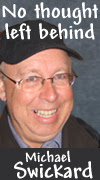 © 2007 by Michael Swickard, Ph.D.
© 2007 by Michael Swickard, Ph.D.
This Sunday is both Father’s Day and my dad’s 86th birthday, though he died in 1993. He was one of those silent dads, not given to unnecessary conversation, similar to Chili Palmer in Get Shorty, who said, “I’m going to say as little as possible, if that.”
Thankfully, my dad was a dignified, thoughtful man. Not the Hollywood fare like Chevy Chase portrays in the movie Vacation or the cartoonish joke of a man played by the character of Homer Simpson. I learned very little from his words and much from his deliberate actions. I am methodical and meticulous like him, though he never told me to be. He just lived that way.
My father George was a large, gentle man who, as far as I can remember, never, ever uttered a swear word. He did not utter many other words about this life and times, but I am no longer mad at him for taking all of his stories, thoughts and feelings to the grave.
Many other World War II veterans exhibit his silence. During family gatherings, we all understood that he was not going to tell war stories. I am lucky that my mother remembered some of the stories he told when they dated a couple of years after he came back from the war, but even what she was told was thin and without many details.
He skipped the last semester of high school to join the Army in February 1942. Because he was a photographer in high school, he was sent to a special combat photographer’s school.
Being a combat photographer put him on the front lines of the European conflict documenting for the generals what was happening. He made the landings in
So how do I know about the air raid? After my father’s death, I was looking through his photos and found some of the original pictures, including one that is used often in books. More than 500 men lost their lives on that raid. How much more he did in war I can only guess.
I do not know how quiet he was when he left for war. After World War II, he served in
I grew up watching him sit quietly, not really looking at anything that I could see, while he smoked his cigarettes. He tranquilized himself daily with alcohol, but was never impaired enough for anyone outside of the family to be aware of his drinking.
Mostly what I noticed, even as a small child, was that with my father there was a distance from me and everyone else, except some of his military buddies at the club. His best friend was a black fellow, another combat photographer, who was about the same size and equally quiet. They routinely sat together in dignity, slowly drinking and smoking cigarettes while speaking one- or two-word sentences that, evidently, spoke volumes to them. I would listen for a few moments, but it was too boring. I did not realize what they saw in their mind’s eye while saying those few words.
Combat finally got my father. He began smoking upon entry into the military. Instead of bullets, what killed him was more than 50 years of smoking. Those solace sticks kept his hands busy while his mind was busy with the past. He watched sports, but would not watch war films.
It appears to me that not all of the wounds of war are seen by doctors. Many soldiers who did not receive purple hearts were just as wounded, my father being one of them. A grateful nation must look back at our silent fathers and accept that they sacrificed more than we can realize for our freedom. Perhaps, on this Father’s Day, you might understand your silent father better if you could know the core of the silence.
Freedom is not free. Millions of men and women died and were injured for our freedoms. I have forgiven my father for his silence, and I hope somewhere, sometime, I can apologize for my anger and tell him how very proud I am to be his son.
Swickard is a weekly columnist for this site. You can reach him at michael@swickard.com.
